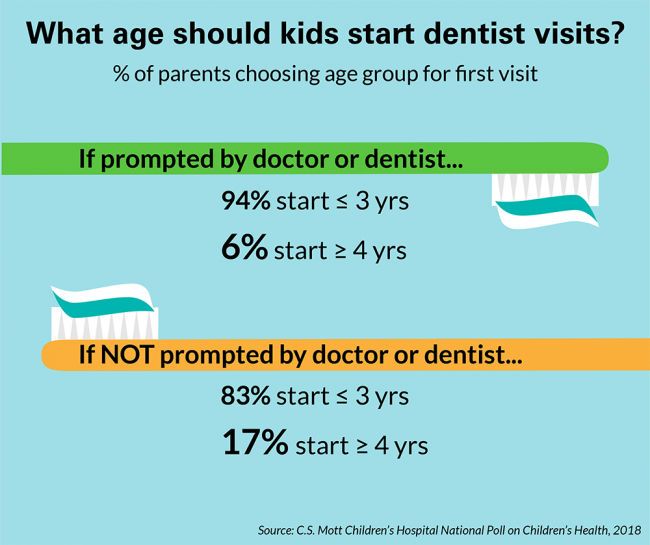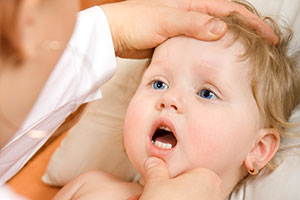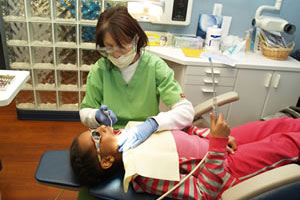Delayed start to dentist visits: Parents need provider prompt


Delayed start to dentist visits: Parents need provider prompt
Visiting the dentist at an early age is an essential part of children’s health care. At early dental visits, the dentist will look for signs of decay on baby teeth and make sure parents understand how to care for their child’s teeth. The age at which children start dental visits varies. The C.S. Mott Children’s Hospital National Poll on Children’s Health asked parents of children age 0-5 years about their beliefs and experiences about when to start dental visits.
Nearly half of parents (45%) said their child’s doctor or a dentist suggested an age to start dental visits. Parents with higher income and education, and those with private dental insurance, were more likely to report a doctor or dentist suggestion about when to start dental visits.
Among parents who said their child’s doctor or a dentist suggested an age to start dental visits, 47% believed children should have their first dentist visit when they are 1 year or younger; 47% said children should start when 2 or 3 years old. Only 6% of parents who received a doctor or dentist suggestion said children should start dentist visits at 4 years or older.
Over half of parents (55%) did not get their information about when to start dentist visits from their child’s doctor or a dentist. Instead, these parents relied on advice from family and friends (14%), their own experience starting dental care (13%) or other sources.
Among parents who were not prompted by a doctor or dentist, only 35% believed dentist visits should start at when children are 1 year or younger, while 48% said they should start at 2-3 years of age. However, 1 in 6 (17%) believed that children should delay their first dentist visit until 4 years or older.
Over half of parents (60%) reported their child has had a dental visit; for 85% of this group, the child’s age at their first visit matched the parents’ belief about when to start dental visits. Most parents (79%) felt the dentist visit was worthwhile.
Among the 40% of parents whose child has not had a dental visit, common reasons for not going to the dentist were that the child is not old enough to go to the dentist (42%), the child’s teeth are healthy (25%), and the child would be scared of the dentist (15%).

Highlights
Among parents of children age 0-5:
- Over half of parents did not receive guidance from their child's doctor or a dentist about when to start dentist visits.
- Professional guidance was more common among parents with higher income, education, and private dental insurance.
- 1 in 6 parents who did not receive guidance from health care providers believed children should delay dentist visits until age 4 years or older.
Implications
Early dentist visits are a key time to educate parents on developing good oral health habits, including correct brushing techniques, the importance of limiting sugary drinks, and the need to avoid putting children to bed with a bottle. Dental visits also are important for the detection and treatment of early childhood caries (dental decay in baby teeth), and the application of fluoride varnish to the baby teeth to prevent future decay. For this reason, the American Academy of Pediatrics (AAP) and the American Dental Association (ADA) both recommend starting dental visits around age 1, when baby teeth emerge.
As shown in this Mott Poll, parental beliefs about when to start dentist visits are not always consistent with national recommendations. About half feel that waiting until 2 or 3 years of age is sufficient; some believe children can delay the start of dentist visits until 4 years or older.
The risk of delaying dentist visits is early signs of tooth decay may not be noticeable. In this poll, one quarter of parents who had delayed dental visits said their child’s teeth are healthy. However, it is unlikely that a parent could detect early tooth decay. By the time decay becomes obvious due to discoloration, the problem likely has become substantial. Prompt dental treatment at the first sign of decay can prevent more significant dental problems. Therefore, having regular dentist visits throughout early childhood increases the likelihood that decay will be identified and treated before major problems develop.
Parents’ lack of awareness of the recommended age to begin dental visits is understandable. Recommendations have changed over the years, so parents who rely on their own experience, or advice from family members, may be hearing outdated advice.
Additionally, parents get much less guidance on when their child should go to the dentist compared to the doctor. Healthcare guidance for parents of young children is often focused on a set schedule of well-child visits with medical providers. Often, the child’s first visit is scheduled before leaving the hospital, and the timing of subsequent visits is communicated clearly. In contrast, there is little discussion about dental visits; over half of parents in this poll do not recall getting information from their child’s doctor or a dentist about when to start dental care. This lack of guidance results in many parents delaying the start of dental visits past the recommended age.
This Mott Poll also shows that provider recommendations for early dental care are not received equally by all parents. Higher-income, more educated, and privately insured parents report receiving guidance from a health care provider on when to start dentist visits more frequently than parents who are low-income, less educated, and on Medicaid. This pattern is particularly problematic because low-income children have elevated rates of early childhood caries and would benefit from early dental care.
Providers who care for at-risk populations should take time to explain and emphasize the importance of dental visits. If health care providers don’t raise the topic, parents should ask their child’s doctor or their own dentist about when to start dentist visits, and how to keep their child’s teeth strong and healthy.

Data Source & Methods
This report presents findings from a nationally representative household survey conducted exclusively by GfK Custom Research, LLC (GfK), for C.S. Mott Children’s Hospital. The survey was administered in November 2017 to a randomly selected, stratified group of parents age 18 and older (n=2,005). Adults were selected from GfK’s web-enabled KnowledgePanel® that closely resembles the U.S. population. The sample was subsequently weighted to reflect population figures from the Census Bureau. The survey completion rate was 60% among panel members contacted to participate. This report is based on responses from 790 parents who had at least one child 0-5 years. The margin of error is ±3 to 6 percentage points.
Findings from the C.S. Mott Children’s Hospital National Poll on Children’s Health do not represent the opinions of the University of Michigan. The University of Michigan reserves all rights over this material.
Citation
Clark SJ, Schultz SL, Singer DC, Gebremariam A, Freed GL. Delayed start to dentist visits: Parents need provider prompt. C.S. Mott Children's Hospital National Poll on Children's Health, University of Michigan. Vol 31, Issue 2, February 2018. Available at: https://mottpoll.org/reports/delayed-start-dentist-visits-parents-need-provider-prompt.



